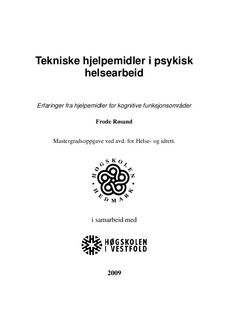Tekniske hjelpemidler i psykisk helsearbeid : erfaringer fra hjelpemidler for kognitive funksjonsområder
Master thesis

Åpne
Permanent lenke
http://hdl.handle.net/11250/132492Utgivelsesdato
2009Metadata
Vis full innførselSammendrag
Norsk:Formålet med undersøkelsen har vært å undersøke hvordan tekniske hjelpemidler påvirker opplevelse av mestring for mennesker med en psykisk lidelse. Tekniske hjelpemidler innen psykisk helse er i praksis nytt, og undersøkelsen har gjennom hjelpere søkt erfaringer rundt bruken av hjelpemidler.
Psykiatrien har ikke hatt fokus på kognisjon og kognitive funksjonshindringer, og man har ikke vært opptatte av å forklare hvordan funksjonshindringer som følge av kognitiv svikt oppstår. Psykisk lidelse har vært sett på som sykdom, mer enn en funksjonshindring. Kognisjon handler om oppfatning, oppmerksomhet, hukommelse, arbeidstempo, evne til problemløsning, evne til å forstå og bruke språk og evne til å oppfatte og handle i forhold til rom og retning.
Datainnsamling og databehandling i undersøkelsen har vært tuftet på en fenomenologisk og hermeneutisk forståelsesmåte. Den metodologiske tilnærmingen har vært både induktiv og eksplorativ, og den metodiske tilnærmingen har vært kvalitativ. Undersøkelsen er gjennomført med semistrukturerte kvalitative intervjuer. Det er i undersøkelsen gjort et strategisk utvalg på fem informanter. Analysen av data har skjedd gjennom en hermeneutisk-fenomenologisk tilnærming, og har vært empiristyrt. Analyseprosessen har fulgt Malterud (1996) sin beskrivelse for å sikre systematikk i analysearbeidet.
Resultatene viser at kognitive utfordringer i stor grad handler om manglende evne til å strukturere og organisere seg, vansker med å huske, høyt stress og lav søvnkvalitet. Disse utfordringene medfører sosiale konsekvenser i hverdagen for brukerne. Resultatene forteller at mange brukere opplever tekniske hjelpemidler som nyttig, men at opplevd nytteverdi avhenger av en god opplæring og oppfølging. Videre gir informantene tilbakemeldinger om at fokuset på tekniske hjelpemidler for mennesker med kognitive funksjonshindringer må holdes oppe fordi dette fortsatt er ukjent for mange hjelpere. English:
The main objective with this research was to explore how technical aids affect the experience of managing everyday life for people with mental disorders. Technical aids in mental health are practically new, and this research has searched for the experience healthcare assistants have towards patients and technical aids.
The psychiatry has not focused on cognition and cognitive functional obstacles so far, and one has not been eager to explain how cognitive functional obstacles from cognitive failure arise. Mental disorder has been looked on as an illness rather than a cognitive functional obstacle. Cognition as a concept contains perceiving, attention, memory, work pace, ability to solve problems, ability to understand and use languages and the ability to act in relations to space and direction.
The collection of data in this research has been sited on a phenomenological and a hermeneutic approach. The methodical approach has been qualitative, and the research has had an inductive and explorative approach. The research has used semi structured qualitative interviews. The five informants have been strategically selected. The analysis of data has gone through a hermeneutic and phenomenological approach, and has been empirically guided. The analysis has followed the guidelines of Malterud (1996) to ensure systematics.
The results shows that cognitive challenges seen in the research are about lack of ability to structure and organize everyday life, difficulties to memorize, high stress and poor sleeping quality. These challenges lead to social consequences in the everyday life for the patients. The results also shows that many patients see the technical aids as useful for coping with every day challenges, but that the advantages depends on the learning process and how the patient and aid is accompanied by healthcare assistants. Technical aids for people with cognitive functional obstacles are still unknown to many healthcare assistants and throughout the public health services